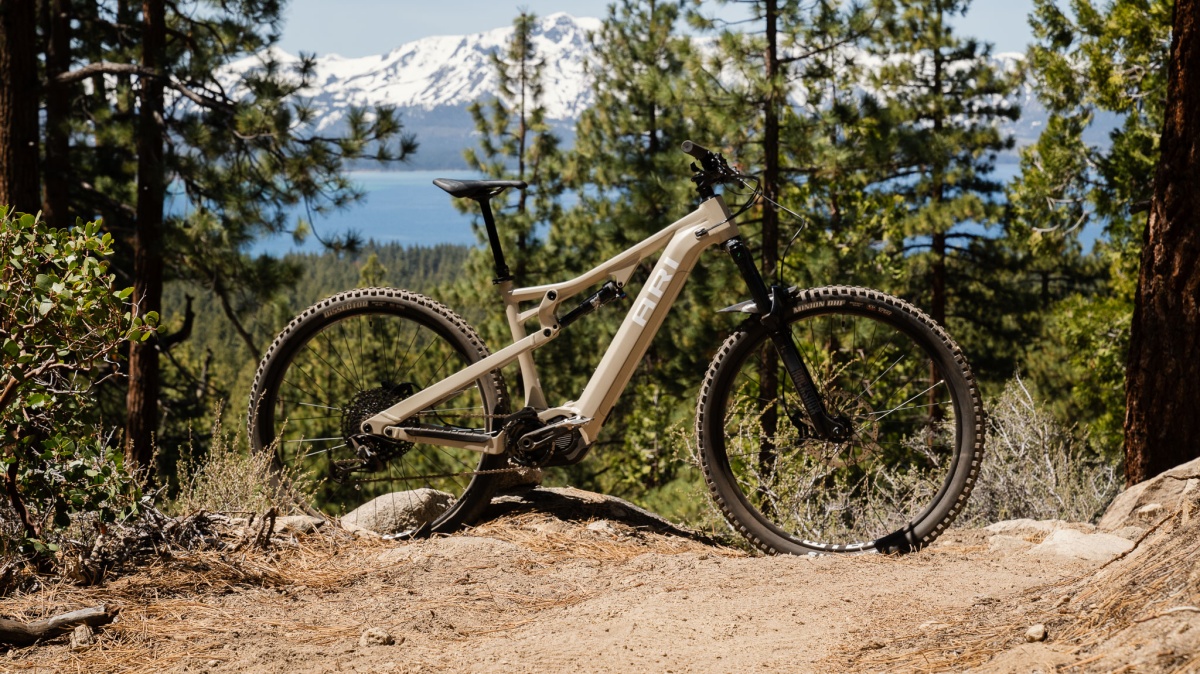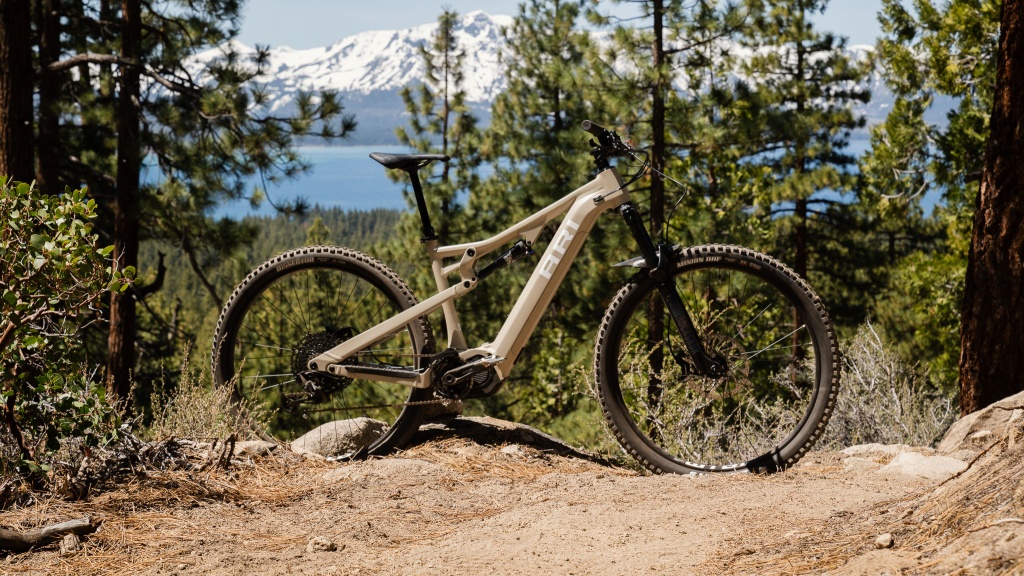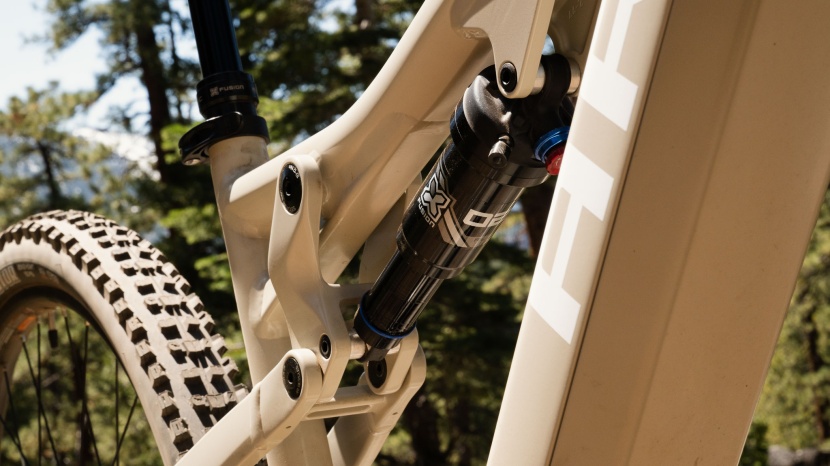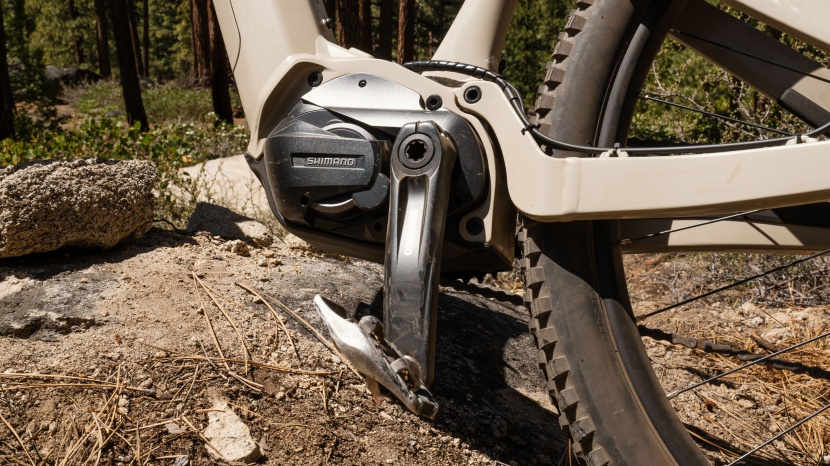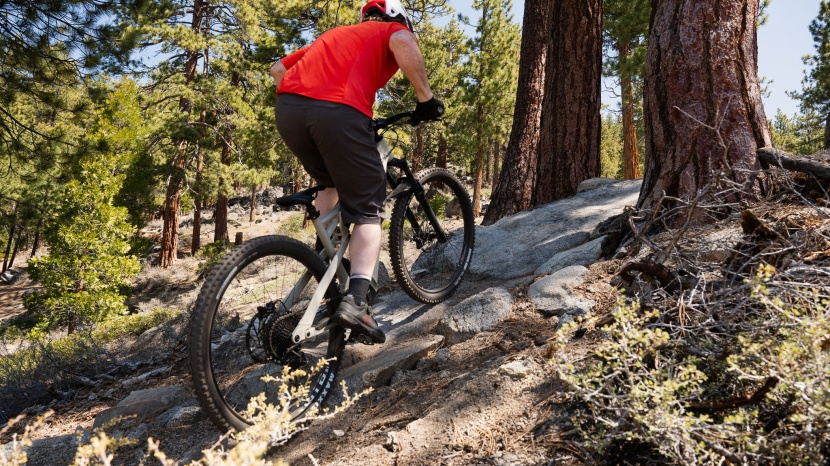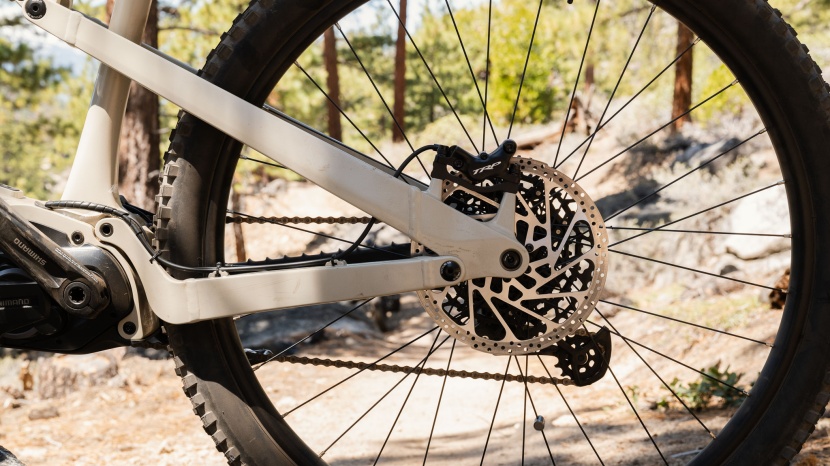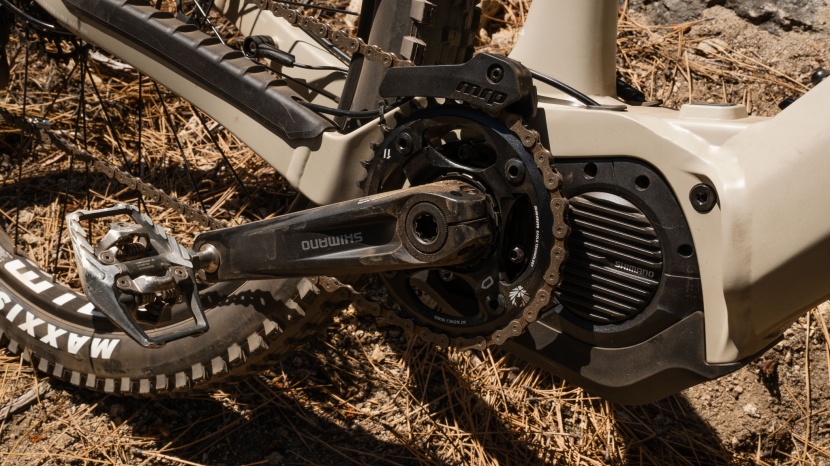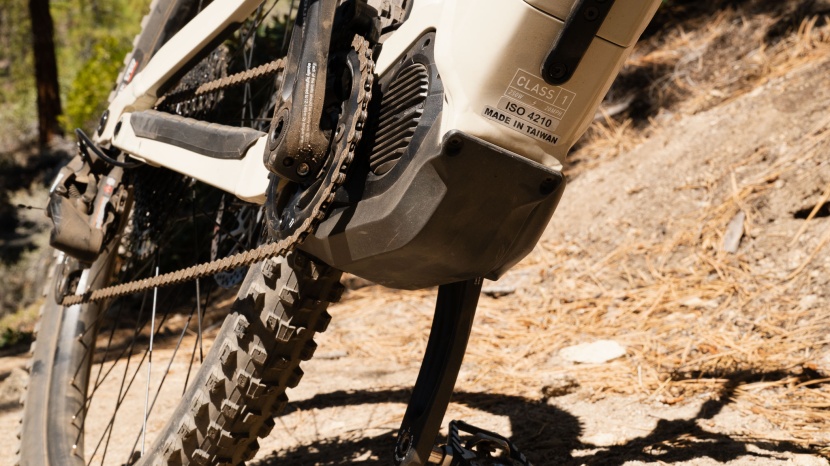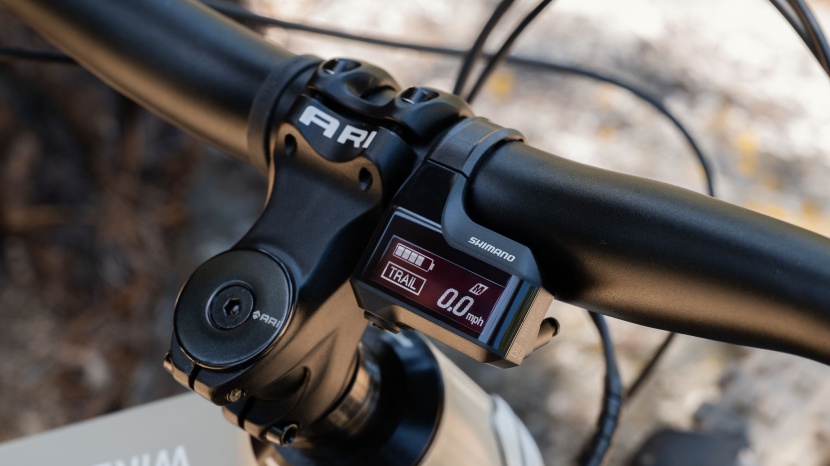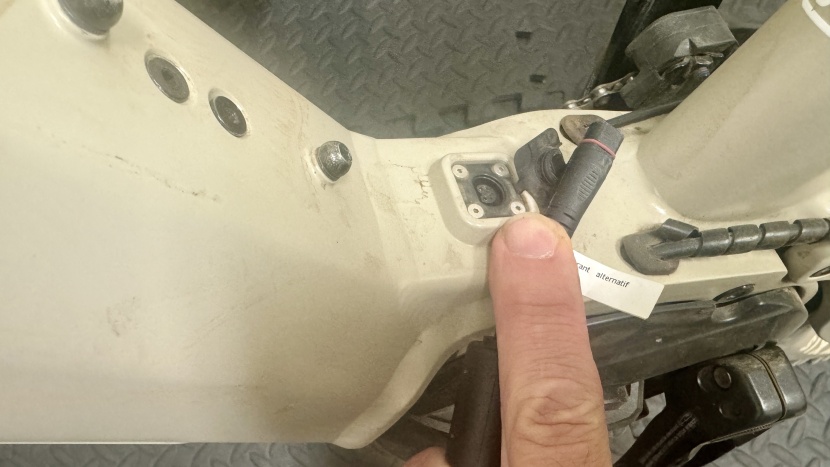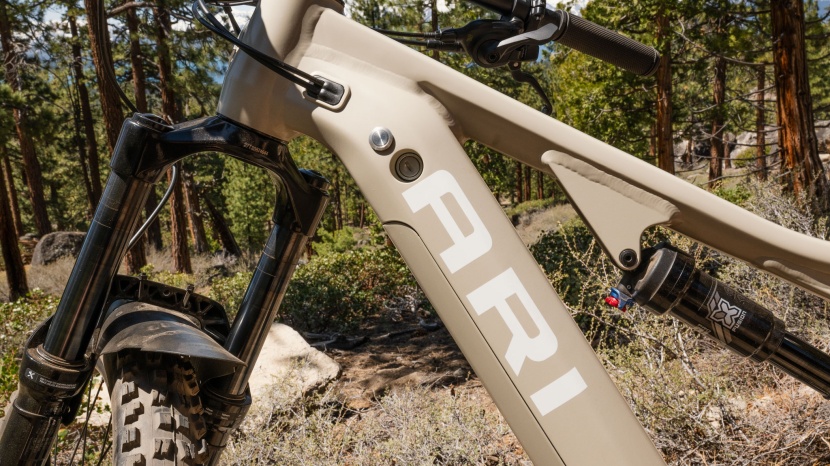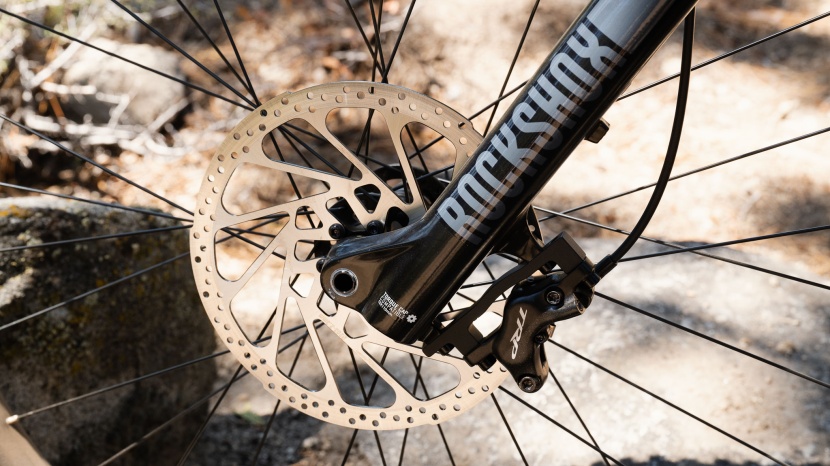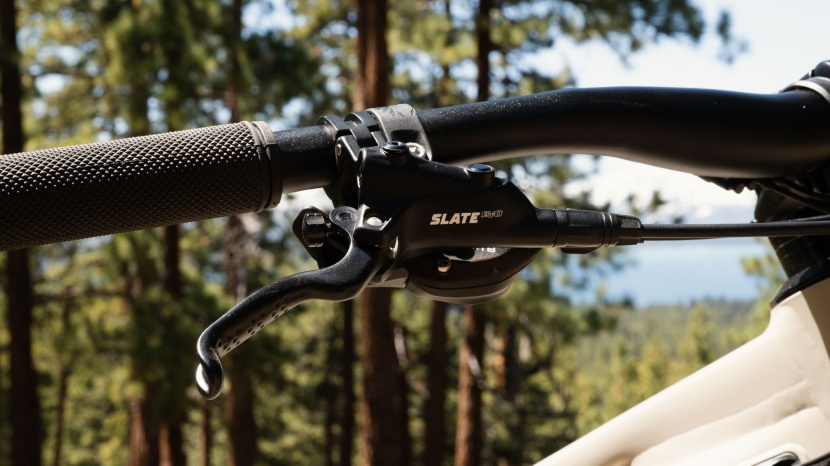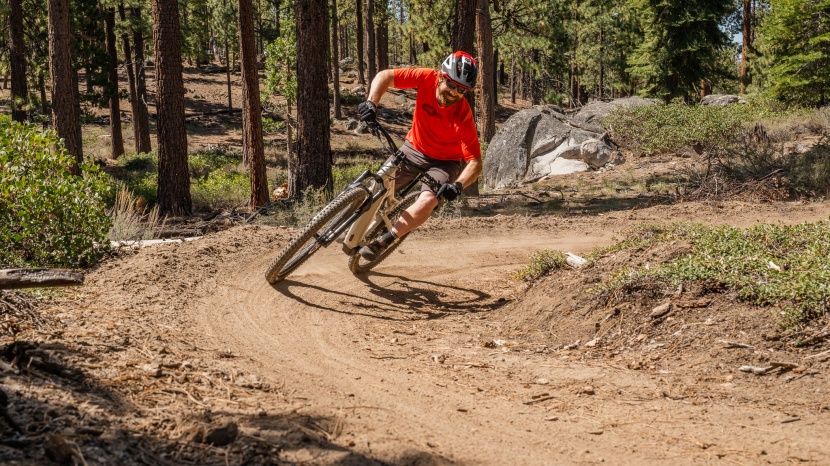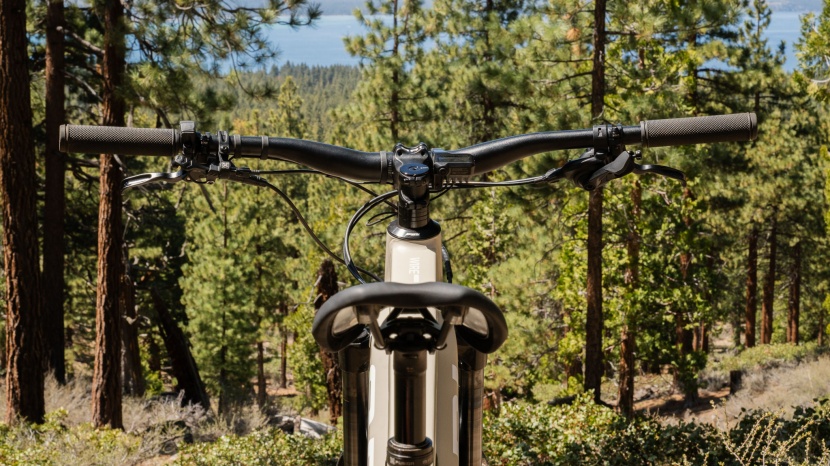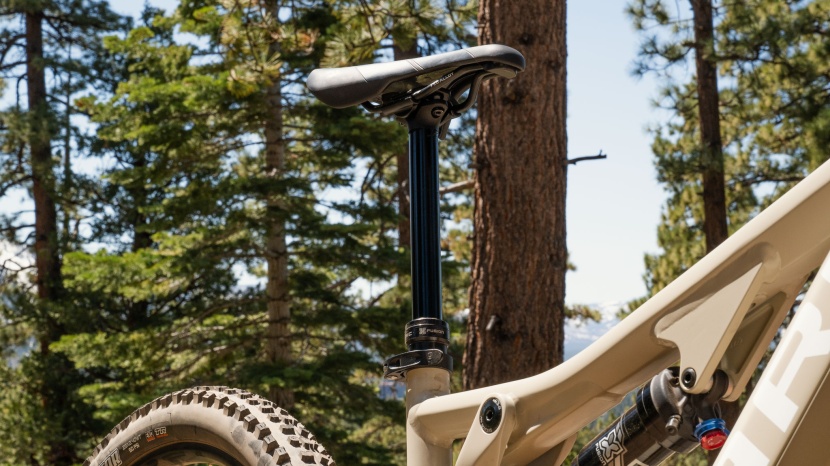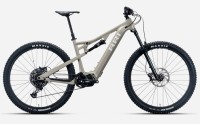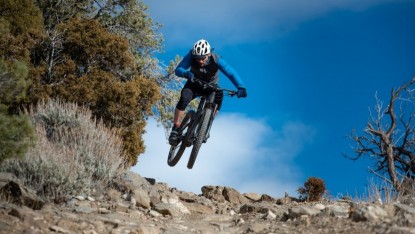
Our Verdict
Our Analysis and Test Results
Ari Bikes, formerly known as Fezzari, has been offering direct-to-consumer bikes since 2008. Based in Utah, the company produces a full line of mountain, road, and electric bikes for all types of riding. The Wire Peak 2.0 brings a new level of value to the electric trail bike market with some respectable components. Advertised as a 145mm / 160mm trial bike, this model actually comes with a 150mm travel fork. Another interesting aspect of the Wire Peak 2.0 lineup is that each model comes with a different motor from Shimano. The 2.7kg E7000 motor featured on our comp model can generate a peak of 500 watts and 60Nm of torque. This is less torque than most full-power e-mountain bikes we've been reviewing, but it's the least expensive full-suspension electric mountain bike we've tested. While there are some underwhelming components, they all exist in the shadow of this bike's price tag.
Downhill Performance
We found the Wire Peak 2.0 to be a competent descender with geometry appropriate for more than just the easy line. With a measured headtube angle of 64.5 degrees (in high setting) on its 562mm axle to crown fork, you'd expect the Ari to be fearless. While the e-bike-specific crown undoubtedly helps stiffen the front end, the 32mm stanchions of the Recon Silver RL 150mm fork don't exude confidence. The bike rips corners and holds its momentum well, while its modern geometry pays dividends on the descents and encourages you to push it a bit. While the bike felt versatile and surprisingly agile on the way down, the fork left us feeling a bit more timid than we would have liked. The bike's mass and geometry could benefit from a stiffer front end that you can find on the higher-spec Wire Peaks. While the fork certainly felt under-gunned, the bike lost elevation quickly and generally elicited smiles from our testers. Ari undoubtedly had to make some compromises to get a bike with these capabilities to our door for this price but those without much suspension experience will enjoy the balanced and stable feel. The TRP 4-piston brakes give the bike powerful deceleration and come to the rescue when the bike feels overwhelmed.
The Wire Peak 2.0 features 145mm of rear travel, and this Comp model is equipped with a 150mm fork. According to Ari, the differences in geometry between bikes with the 150mm Recon Silver fork (562 axle to crown) and the bikes with 160mm forks at sag were so minimal that it didn't justify a different geometry chart. That may be the case, but we measured the Wire Peak's headtube angle at 64 degrees with a 569mm axle-to-crown measurement of the RockShox Recon, using the bike in the Short setting, and 64.5 degrees in the Long setting. This is slacker than the geometry chart would lead you to believe. Ari has the headtube angle listed at 65/66 in those respective settings, and a slightly longer (160mm) fork would relax those numbers even further.
Geometry details aside, the bike still feels like a versatile trail ripper, and there aren't many places it doesn't want to go. There is enough travel for aggressive lines and medium-sized drops, but it doesn't feel like overkill. The bike doesn't exactly feel agile, but that has more to do with its mass than its disposition. Flowy trails, swoopy berms, and rock gardens are this bike's forte. The reach on our size Large measures 480mm, so even with the slacker head tube, it feels plenty roomy. Given the reach, you'd think the wheelbase would be longer on this bike, but its short (434mm) chain stays give the bike a measured 1244mm span (claimed 1234mm). The bike feels alive at higher speeds, where its length and slack head tube give it a sense of confidence. At slower speeds, the steering gets a bit heavy and lethargic, but the bike's power helps you conquer the unintended lines with abandon. The 4-bar rear suspension gives the rear end predictable capability, and while the shock doesn't impress with its performance, it does a decent job of muting the chatter.
The three versions of the Wire Peak come with not only different suspension components but also different motors. There is likely a significant difference in the way that the three models ride, but they share the same “basic” geometry and specs. The Wire Peak Comp we're testing puts out 60Nm of torque, while the Elite build uses a Shimano EP800 motor and the Pro model uses an EP6 motor that each generates 85Nm of torque. We didn't feel that the bike was underpowered when riding solo, but when compared to other full-powered e-bikes, we struggled to keep pace.
Climbing Performance
The Wire Peak Comp scurried up the climbs with relative ease; even with less torque than other e-bikes, the motor can dominate slower-speed climbing. Of course, there is more to climbing than the motor's ample power assist, and this is where we look at how the geometry and kinematics come together to help maximize your efforts ascending. While Ari says the 150mm (vs. 160mm) fork on this bike doesn't affect the geometry, there were a few measurements we took that just don't jive with the stated numbers. Foremost is the seat tube angle; Ari reports 77.5 degrees across all sizes or 78 degrees in the long setting. We measured an effective seat tube angle of 78.5 and 79 degrees, respectively, making this one of the steepest bikes we've ever ridden. The seat tube angle would coincide with their numbers if the front end had an extra 10mm of fork. Luckily, the bike has a long reach, so you still feel like there is adequate room in the cockpit. Being directly over the cranks helps you put the power into the drivetrain and keep your weight in front of the rear axle on steep climbs. The short 434mm chainstays on this bike would seem to tuck that rear axle up close behind you, but this steep seat tube helps to neutralize that effect. The bike rips up most terrain with ease, in slower bits of trail, we found the front end wanting to wander, and it required a bit more muscle to stabilize.
Climbing on this bike without the motor's assistance isn't fun or rewarding; you feel the bike's mass with each turn of the pedals. While the motor doesn't seem to add much resistance to the drivetrain, the weight of the bike feels punishing. The added watts give the bike a peppy feeling in the Trail and Boost settings, allowing you to crush the lines you can't finesse. The short chainstays allow you to pull the front end up with ease and pivot the bike easily. Climbing in the ECO mode is much like climbing a normal-weight mountain bike under your own power.
Ari's 4-bar suspension design provides sufficient pedaling support while keeping the rear end active enough to maintain traction almost anywhere. The bike always felt planted and never struggled for traction while grinding up challenging terrain. If the suspension design lacks anything in efficiency, it's overshadowed by the electrified drivetrain.
The X-Fusion 02 Pro RL shock on the Wire Peak has a rebound adjustment and a compression damping lockout. A lockout is useful when climbing to eliminate some unwanted bob, but the valving is aggressive and creates a firm lockout that isn't easy on the shock or DU bushing. The lower DU bushing on our shock needed to be replaced after approximately ten rides. Although it's a relatively simple procedure, the shocks used on the Elite and Pro models would likely not have the same issue due to better valving. The rest of the bike facilitates your uphill journeys quite well; the SRAM SX Eagle drivetrain is unremarkable but has ample range. The Shimano cranks measure 160mm, which helps avoid pedal strikes, and the slight decrease in torque isn't noticed on this bike.
Range
With a 635Wh Darfon battery powering Shimano's E7000 motor, the Wire Peak Comp gives you a boost that lasts long enough for moderate-length trail rides. Using our standardized test course with the bike at a full charge in its Boost setting, we set off on our repeated road climb and descent. Our 170-pound test rider was able to ride 20.58 miles while climbing almost 4,000 feet before depleting the battery. During this test, we pedal the bike only enough to trigger the torque sensor, so you can likely ride significantly further than we did in this test. That said, compared to other e-bikes we've tested on the same course using the same methodology, the Wire Peak scores near the bottom in our range metric.
Power Output
The Wire Peak Comp uses Shimano's E7000 motor, which they market as their “adventurous urban lifestyle” motor. The motor has a nominal power rating of 250 watts and produces a peak of 60 Nm of torque. The three assist modes are fully customizable using Shimano's E-Tube Ride app. In the E-tube app, you can adjust the level of assistance, maximum torque per setting, and the speed at which the assist engages. The motor weighs a little over 6 pounds and is resistant to mud and water intrusion. Shimano doesn't provide an IP rating but claims the unit is “waterproof”. While lower in power than similar motors of the same weight, the E7000 is economical, allowing Ari to price this bike competitively.
Ari has done something interesting with the Wire Peak line by giving each model a different motor. They all use the same mounting pattern, so it allows them to make a single frame and spec it in different ways. The E7000's 60Nm of torque is an anomaly in the “full power / full weight” e-mtb segment. Most of the bikes with full-sized mid-drive motors and large batteries, like the Wire Peak Elite or Specialized Levo, are putting out 85-100Nm of torque. In comparison, the Fazua Ride60 motor that we find on the Santa Cruz Heckler SL produces the same amount of torque but weighs 2 pounds less. The E7000 provides power in a smooth, predictable way that is easy to adjust to and seldom surprising. The motor is a bit noisier than others we've tested, but on dirt and rough terrain, the sound is mostly muted by the tires on the ground.
E-Bike Controls
The Wire Peak uses Shimano's E7000 switch unit and display. The display is a simple 3.5cm monochrome LCD that displays your pedal assist mode, the battery's state of charge, and your current speed. A small button located on the lower side of the display allows you to toggle through different screens and access additional information about your ride. You can view your estimated range, maximum speed, average speed, and a host of other useful data points.
The switch unit is mounted just inside the left handlebar grip, where your thumb has easy access to the two buttons. Pushing up or down adjusts your pedal assist modes from OFF, ECO, TRAIL, and BOOST. A long push of the lower button accesses WALK mode, where the bike powers itself at a walking speed. The bike features a power button located on the left side of the downtube, housed within a stainless steel ring. Turning the bike on with large fingers is a bit of a challenge, as the power button is depressed deep inside the recess. Below the power button is a slot for the key that allows you to unlock and remove the battery.
Charging this Wire Peak is pretty straightforward using the Darfon 2.3 amp charger. The charge port is located above the motor in a near-ideal position, out of the mud and debris stream. The charging port also has a small rubber cover that keeps water out should you be riding in the rain or have a leaky water bottle. Charging from 0 to 100 percent took us 3 hours, 38 minutes.
Build
The Wire Peak Comp build we tested makes a few compromises for the sake of affordability. As mentioned above, the RockShox Recon Silver RL fork uses 32mm stanchions, which would feel suspect on any other 150mm fork but feel especially dainty on the front of this 55-pound steed. The SRAM SX drivetrain gives the bike ample range but doesn't feel particularly refined, which is fine at this price point. The WTB rims are laced up to Bear Pawls hubs and stayed mostly round during testing. The rear wheel needed to be re-tensioned after a few rides. The rear hub uses an HG-free hub body, so you cannot upgrade from the SX cassette on this bike without replacing the rear hub or wheel. The TRP Slate EVO brakes connect with 200mm rotors and have no issue stopping the big bike, even on long, rotor-cooking descents. The rest of the build we found to be pretty impressive at this price point and did not distract from the bike's ride quality.
The Comp build is the least expensive of the three Wire Peak builds Ari offers. Advanced riders might want to consider stepping up to the Elite build with a 35mm fork or the Pro build with a 36mm fork. Those just getting into an electric mountain bike or those with tighter budgets should rejoice as this bike provides excellent performance for the dollar and is readily upgradeable. As this is one of the least expensive e-mtbs we've reviewed, we think that Ari did a good job bringing it to market at this price point with as few compromises as it has. Our first upgrade to this bike would be the fork, so if you're vacillating between this bike and the Elite build, consider this bike with a fork upgrade. A rear shock with more adjustable compression damping would also be a nice addition, but it would have less effect on the overall ride quality.
Ari gave us some capable rubber on this bike; the Maxxis Minion DHF 29X2.5 WT EXO up front gives not only precision steering confidence but also some levitation on soft and sandy soil. The rear Maxxis Dissector 29X2.4 EXO is a good compromise of solid traction and decent rolling resistance. Heavier or more aggressive users may want to opt for an EXO+ or DD casing on the rear that provides a bit more support on the sidewall. The tires mount up to 30mm internal width WTB rims and can be set up tubeless prior to shipping as an option.
The cockpit feels long in part due to its 480mm reach, but the 55mm stem brings your weight a bit further than we would have preferred. The Ari-branded 35mm bar and stem were plenty stiff, and the 780mm width provided ample leverage over the front end. We appreciated the 175mm dropper post and the difference that much drop makes when pointing this bike downhill. The Selle Italia X3 saddle on top of that dropper was another story, with most of our testers finding it less than comfortable.
Should You Buy the Ari Wire Peak 2.0 Comp?
The Wire Peak Comp is a pretty good deal, but you'd be wise to consider the compromises it makes to achieve that price point. For the newer mountain biker or someone just getting into powered riding, you'll find smile-inducing performance and enough versatility to ride most anywhere. For the more seasoned rider, you may find the fork inadequate or the power underwhelming, but this bike's exceptional price point overshadows these criticisms. The fork is our main gripe with this bike; having less travel and a lower axle-to-crown measurement than the other Wire Peak models affects the bike's geometry and handling. The 60Nm motor and 635Wh battery provide some get-up-and-go, but the bike lacks the performance characteristics of those priced just a bit higher. At this price point, the bike is a great value; stepping up to the Elite model is an extra $900, and there is considerable competition at that price point.
What Other Electric Mountain Bike Should You Consider?
E-Mountain bikes aren't cheap, but that doesn't mean there aren't some exceptional values in the market. The Aventon Ramblas is the least expensive electric mountain bike we've tested, and it's quite good. An unimpressive suspension fork aside, the bike has a surprisingly quality part spec and some strange touches, like a kickstand and tail lights built into the frame. The hardtail bike sells for $2899 and is the most powerful e-bike we've tested to date with a 100Nm mid-drive motor. The Specialized Turbo Levo Alloy provides an exceptionally good electrified ride, and while it costs $5500, we consider it an excellent value. The bike has a 700Wh battery, a Brose motor producing 90Nm of torque, and one of the best e-bike control systems we've tested.
| Awards | |
|---|---|
| Price | $4,999 List |
Overall Score  |
|
| Star Rating | |
| Bottom Line | A budget-priced e-bike that punches above its weight class but can't quite escape the idiom that you get what you pay for |
| Pros | Value-priced, Capable |
| Cons | Underwhelming fork, Low torque, Less range |
| Rating Categories | Ari Wire Peak 2.0 Comp |
| Downhill Performance (30%) | |
| Climbing Performance (25%) | |
| Measured Effective Range (25%) | |
| Power Output (15%) | |
| E-Bike Controls (5%) | |
| Specifications | Ari Wire Peak 2.0 Comp |
| Battery Size (Wh) | 635Wh |
| Wheel size (inches) | 29 |
| Motor System | Shimano E7000 |
| Motor Power (torque) | 60Nm |
| Measured Weight (w/o pedals) | 55 lbs (Large) |
| Measured Effective Range | 20.5 miles |
| Fork | RockShox Recon SIlver RL 150mm |
| Suspension & Travel | 4- bar Linkage |
| Shock | X-Fusion 02 Pro RL |
| Frame Material | Aluminum |
| Frame Size Tested | Large |
| Available Sizes | S-XL |
| Wheelset | WTB ST i30 TCS |
| Front Tire | Maxxis Minion DHF EXO 29 x 2.5" WT |
| Rear Tire | Maxxis Dissector EXO 29x2.4" |
| Shifters | SRAM SX Eagle |
| Rear Derailleur | SRAM SX Eagle |
| Crankset | Shimano FC-E8000 |
| Crankarm length | 160mm |
| Cassette | SRAM PG-1210 11-50t |
| Chain | SRAM SX Eagle |
| Saddle | Selle Italia X3 boost 148mm |
| Seatpost | X-Fusion Manic 175mm (Size Large) |
| Handlebar | Ari Team 35 800mm 25mm rise |
| Stem | Ari 35 |
| Brakes | TRP Slate EVO 200mm rotors |
| Grips | Lock-On |
| Measured Effective Top Tube (mm) | 613 |
| Measured Reach (mm) | 480 |
| Measured Head Tube Angle | 64.5 High / 64 Low |
| Measured Seat Tube Angle (effective) | 79 High/ 78.5 Short |
| Measured Bottom Bracket Height (mm) | 345mm |
| Measured Wheelbase (mm) | 1244 |
| Measured Chain Stay Length (mm) | 434 |


